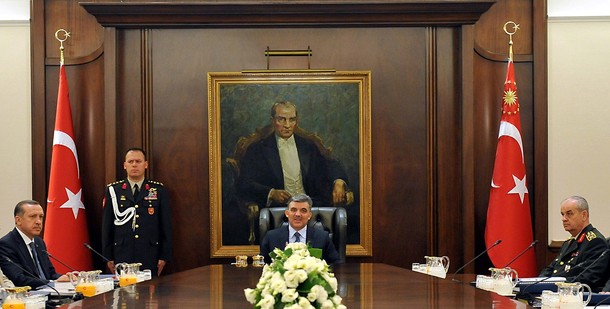
Ankara Approves Controversial “Midnight Legislation”
Publication: Eurasia Daily Monitor Volume: 6 Issue: 126
By:

Since June 12, the Turkish political elites have actively debated the authenticity of an unclassified military document outlining an alleged action plan for the military to combat the "reactionary activities" against secularism. Allegedly the "Action Plan against Reactionaries (Irtica)," was prepared by senior staff Colonel Dursun Cicek and defines the ruling AKP and the Gulen movement as threats to the secular order in Turkey. The plan outlined various measures to undermine public support for the AKP and advocated a conspiracy against the Gulen movement to represent it as an armed criminal group that could be construed as a terrorist organization (EDM, June 23).
During a press conference on June 26 the Chief of the General Staff General Ilker Basbug shared the latest results of the investigation by military prosecutors. General Basbug stated that the alleged document was not authentic, a fabrication and that the dossier was sent to the civil prosecutors to investigate who produced this fake document (NTV, June 26). He tried to reassure the public that the military court system was independent, and free from any influence that might come from the generals. However, liberal intellectuals harshly criticized Basbug over whether the military court system is indeed free from the influence of high ranking officers (www.haberturk.com, June 26).
Only a few hours after Basbug’s press conference Prime Minister Recep Tayyip Erdogan said that it was time for a civil prosecutor to investigate whether the document was authentic. His intervention escalated the debate on the military court system (Anadolu Ajansi, June 26; Taraf, June 27).
On June 27 one Turkish daily reported that the ruling party had passed legislation on June 26, at 1.30 am, restricting the power of the military court. In fact, the Turkish parliament, with the participation of small number of opposition deputies, passed legislation that restricts the power of military courts, which sparked new tension between the Justice and Development Party (AKP) government and the secularist opposition and the military. According to the recent amendment made in the Code of Criminal Procedures, or CMUK, with last-minute proposals by the AKP deputies; the civilian courts will be able to prosecute members of the armed forces accused of various crimes including: threats to national security, constitutional violations, organizing armed groups and attempts to topple the government in peace time. The legislation also transfers the power to civil courts to prosecute civilians in peace time for offences outlined in the military penal code (Hurriyet Daily News, June 29).
The opposition parties remained silent during the session. However, when the media reported that the legislation restricts the power of the military court, opposition Republican Peoples’ Party (CHP) deputies accused the AKP of cheating (Cumhuriyet, June 27). The Chairman of the CHP, Deniz Baykal characterized the AKP’s way of passing the legislation as a "midnight coup" (Hurriyet Daily News, June 29).
The CHP has further alleged that the AKP’s actions revealed the government’s distrust of the military court system, preferring instead to use the civil courts in such cases (www.cnnturk, June 30). Nonetheless, military officers had already applied to the court to transfer their files to the military courts (Anadolu Ajansi, June 17). The distinction between the military and civil courts became clearer when the military prosecutor found no evidence to support the alleged "Action Plan against Reactionaries (Irtica)" and concluded his investigation without making any charges. While, the civil court detained Colonel Cicek, for allegedly preparing the action plan, and being a member of the Ergenekon criminal network (Milliyet, July 1).
The AKP deputies on the other hand claimed that the Justice Minister Sadullah Ergin visited opposition parties on the eve of the parliamentary session and told them about the planned amendment as a requirement of the European Union (Vatan, June 27). Erdogan vigorously defended the adopted legislation and accused opposition parties of ignoring the sessions in the parliament. "The parliamentary group deputy leader of the Republican People’s Party [or CHP] criticizes the move and says it is typical of the ruling party to cheat them. We all voted on the legislation [together with the opposition votes]. Where were you?" asked Erdogan (Anadolu Ajansi, June 27).
In addition, the pro-government media revealed a document indicating that military staff at the defense ministry tentatively backed judicial reform within the armed forces in order to harmonize Turkish laws with E.U. norms. This legislation permits civilian involvement in military affairs, by holding civil court cases rather than military tribunals (Today’s Zaman, July 1).
The new amendment also disappointed the armed forces. Basbug visited Erdogan and shared the concerns of the military over the new legislation that restricts the power of military courts (Hurriyet, June 30). The Turkish press reported that as a result of the recent amendment, a civil prosecutor could investigate the chief of the general staff without obtaining permission from a higher authority (www.haberturk.com, June 30). Turkish prosecutors cannot launch an investigation without receiving permission from a higher authority within the bureaucratic hierarchy. However, AKP deputies rejected the idea that the chief of the general staff can be prosecuted without the approval of the prime minister (Taraf, July 1).
After the eight-hour long National Security Council (MGK) meeting, President Abdullah Gul, Erdogan, Basbug, Ergin and the Deputy Prime Minister Cemil Cicek held further discussions, though no statement was issued. However, the opposition expects that the president will veto the legislation (Taraf, July 1) even though the E.U. is backing the reform (Zaman, June 30). Meanwhile, liberals suggest that if Gul vetoes the amendment it will damage Turkish democracy, since it means that he bowed to pressure from the military to scupper the legislation (www.cnnturk, June 30, Taraf, July 1).




